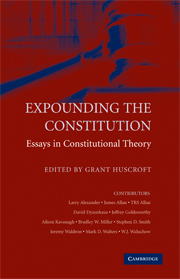Book contents
- Frontmatter
- Contents
- Preface
- Contributors
- Introduction
- PART I MORALITY AND THE ENTERPRISE OF INTERPRETATION
- PART II JUDICIAL REVIEW, LEGITIMACY, AND JUSTIFICATION
- PART III WRITTEN AND UNWRITTEN CONSTITUTIONAL PRINCIPLES
- 9 Constitutional Justice and the Concept of Law
- 10 Written Constitutions and Unwritten Constitutionalism
- 11 Unwritten Constitutional Principles
- Index
11 - Unwritten Constitutional Principles
Published online by Cambridge University Press: 25 July 2009
- Frontmatter
- Contents
- Preface
- Contributors
- Introduction
- PART I MORALITY AND THE ENTERPRISE OF INTERPRETATION
- PART II JUDICIAL REVIEW, LEGITIMACY, AND JUSTIFICATION
- PART III WRITTEN AND UNWRITTEN CONSTITUTIONAL PRINCIPLES
- 9 Constitutional Justice and the Concept of Law
- 10 Written Constitutions and Unwritten Constitutionalism
- 11 Unwritten Constitutional Principles
- Index
Summary
INTRODUCTION
All of the constitutions I am familiar with have given rise to claims that they include or presuppose “unwritten” or “implied” principles. These principles can be relatively specific, such as the implied freedom of political communication, first “discovered” by the High Court of Australia in 1992. Or they can be quite abstract, such as “the rule of law,” which is regarded almost everywhere as a constitutional principle of some kind. They may concern individual rights or freedoms, governmental powers or immunities, or institutional safeguards such as the separation of judicial power. But all, in some way, qualify or override the authority of legislatures.
It is generally accepted that, whereas moral norms apply to us of their own force, whether or not we have adopted or subscribed to them, legal norms owe their existence to the practices of a particular time and place, whether by deliberate enactment or by the evolution of custom. Even unwritten or implied constitutional principles can plausibly be thought to exist only if the legal system in question has, in some way, adopted or committed itself to them. But purported discoveries of such principles are often novel, in that the principles had previously gone unnoticed. For example, the implied freedom of political communication, “discovered” by the Australian High Court in 1992, had not been noticed by lawyers and judges for the previous ninety years, except for one notoriously “activist” judge in the 1980s.
- Type
- Chapter
- Information
- Expounding the ConstitutionEssays in Constitutional Theory, pp. 277 - 312Publisher: Cambridge University PressPrint publication year: 2008
- 7
- Cited by

